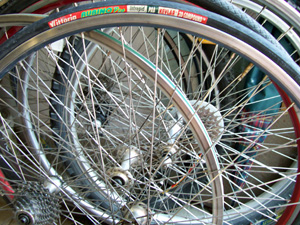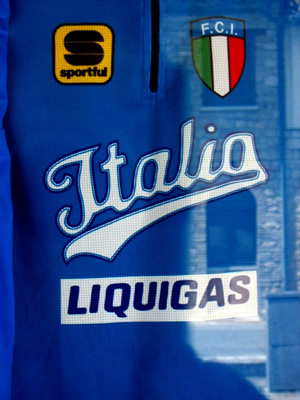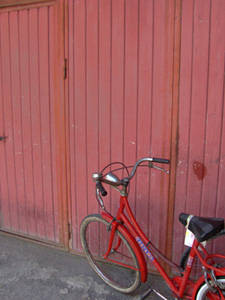| |
The brakes squealed under my feet as
I attempted to regain control while racing down the
hill. I started to panic and clenched the handlebars
with the Vulcan death grip.
Fighting the powerful wind, my eyes watered uncontrollably.
My hair flapped wildly. Goosebumps lined my arms in
rows like the grape vines in the backyard vineyards
to my right.
I succumbed to the freedom that swept away my body
and my mind as I rocketed to the bottom of the hill,
finally halting with the brakes. Completely surrounded
by mountains on all sides, I stood mesmerized and
overwhelmed by the scene, straight from a watercolor
picture.
I yearned for that rush of adrenaline again. It felt
like a newly blossoming relationship where you simply
can’t get enough of someone, and it quickly
escalates into an absolute obsession.
Admittedly, I became obsessed with cycling after
that day. |
|
|
|
 |
Now I understand why people in the Marche (mar-kay) region
of Italy cycle almost daily — the experience is perfectly
overwhelming.
The area’s continuous, rolling hills peak in the mountains
of the Apennine range, blanketing the landscape in rich tones
of greens. Le Marche is home to bountiful wildlife and many
national parks. Several smaller rivers cut through the mountains,
providing a calming, soothing atmosphere for cyclists.
The mild, favorable climate and steep hills are the two reasons
why cyclist and bicycle shop owner Walter Basili thinks both
locals and foreigners favor Le Marche.
“Summer is the best season to cycle. But, because of
Italy’s nice weather, everyone cycles throughout the
entire year,” he said. |
|
| |
Basili lives and trains in Le Marche, a relatively
unexplored, less populated region that attracts
thousands of local and international cyclists each
year.
Although Basili has never competed in the famous
Giro d’Italia, he has participated in and
won numerous competitions in Italy as well as other
European countries.
“The most memorable thing about these races
is the experience of cycling with foreigners and
forming friendships,” said Basili.
He received the silver medal in a race in Manchester,
England, and now proudly displays the medal above
the cash register of his shop.
Basili is the captain of a cycling team that includes
40 participants in Cagli, a small city in Le Marche.
Road cycling races vary in duration and number
of competitors. Some, like the Giro d’Italia,
are demanding, and take several days or weeks. Others
are purely for entertainment.
The Giro d’Italia covers over 200 km and
attracts more than 10,000 cyclists from around the
world, similar to the Tour de France. The lead cyclist
at each checkpoint of Giro d’Italia receives
a pink jersey to wear during the following leg of
the race. This year, the Giro d’Italia began
in Reggio Calabria and ended in Bologna, as it does
every year. |
|
|
|
 |
In order to place well in these races, cyclists like Basili
must train relentlessly for two to three months prior to each
race.
The typical training that competitive cyclists endure is
intense, requiring much dedication and perseverance. Basili
said that he and his team train two to three hours per day,
covering at least 70-80 km on routes extending from the mountains
in Cagli to the beaches of the Adriatic Sea. Cyclists also
eat strict diets, consisting mostly of protein-rich foods,
and they also supplement their diets with several types of
vitamins.
In this region, though, cycling is mostly recreational rather
than competitive. The picturesque scenery in Le Marche and
nearby regions of Umbria and Tuscany has attracted cyclists
from around the world. These three regions of Italy are the
most popular cycling sites in the country, and among the most
favored in the world, according to Cycle Italia, a web magazine
devoted to the sport.
Not only does Le Marche’s scenery appeal greatly to
road cyclists but the region has also become a popular area
for mountain bikers because of the trails throughout the mountains. |
|
Salvatori Tommaso, a local mountain biker who lives in
the region of Umbria, comes to Cagli regularly because he
is a member of the Basili cycling team.
“The scenery here makes Le Marche a great place to cycle,”
said Tommaso. “This is why I come here so often.”
This region provides a peaceful environment for cyclists
because it contains less populated towns, allowing cyclists
to explore the winding roads without the threat of motor vehicles
— a nice change from the chaotic cycling experience
in the United States and larger European cities.
As a sport, the popularity of cycling has increased thanks
to icons like the United States’ Lance Armstrong and
Italy’s Marco Pantani, both of whom have inspired many
Italians to develop an obsession with cycling.
Pantani, who recently died of a heart attack, was the last
man to win both the Tour de France and the Giro d’Italia
in the same year.
“Pantani is the idol of Italy because even though he
didn’t always win the way Lance Armstrong did, he put
on a show in each of his races. It was exciting to watch him,”
Basili recalled. |
|
|
 |
I felt the excitement in Basili’s voice
as he idolized Pantani, and I recalled my cycling trip through
the mountains. The watercolor picture refreshed again in my
mind.
“I can see why cyclists from around the world travel
here just to cycle,” Tommaso said. “It is the
perfect environment.”
I could not agree more.
|
|
|

